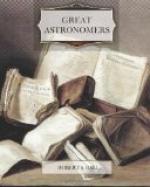This revolutionary attitude towards the ancient beliefs was not calculated to render Galileo’s relations with the University authorities harmonious. He had also the misfortune to make enemies in other quarters. Don Giovanni de Medici, who was then the Governor of the Port of Leghorn, had designed some contrivance by which he proposed to pump out a dock. But Galileo showed up the absurdity of this enterprise in such an aggressive manner that Don Giovanni took mortal offence, nor was he mollified when the truths of Galileo’s criticisms were abundantly verified by the total failure of his ridiculous invention. In various ways Galileo was made to feel his position at Pisa so unpleasant that he was at length compelled to abandon his chair in the University. The active exertions of his friends, of whom Galileo was so fortunate as to have had throughout his life an abundant supply, then secured his election to the Professorship of Mathematics at Padua, whither he went in 1592.
[Plate: Portrait of Galileo.]
It was in this new position that Galileo entered on that marvellous career of investigation which was destined to revolutionize science. The zeal with which he discharged his professorial duties was indeed of the most unremitting character. He speedily drew such crowds to listen to his discourses on Natural Philosophy that his lecture-room was filled to overflowing. He also received many private pupils in his house for special instruction. Every moment that could be spared from these labours was devoted to his private study and to his incessant experiments.




